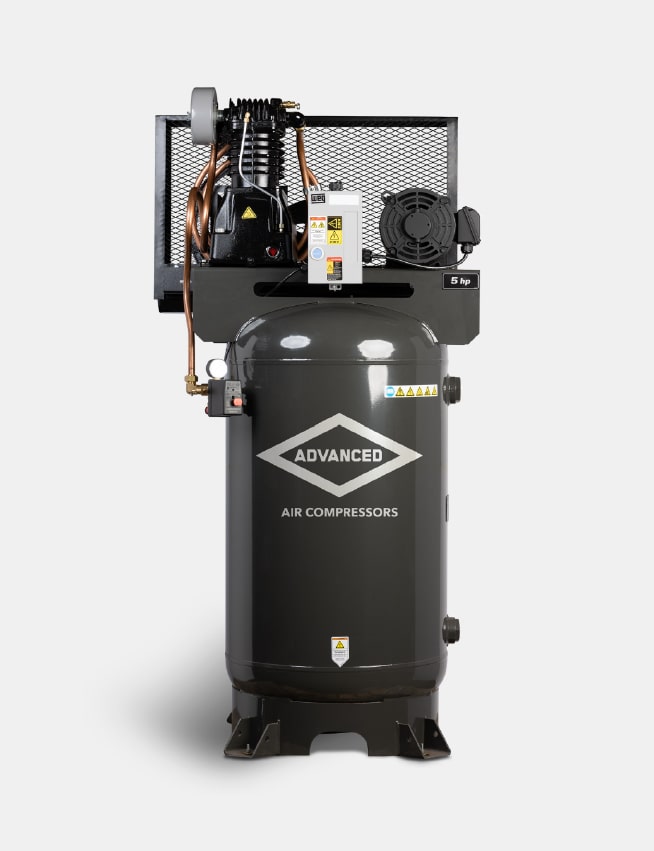When you’re considering getting into an industrial air compressor, there are a lot of questions you may have about exactly what you need and which options are best for your setup. Fortunately, with the extensive knowledge we have of the industry, we can help you through the process. We’ve developed this guide to make it much easier for you to determine exactly what you need and what features may benefit your situation.
There may be several reasons why you’re considering an industrial air compressor. Perhaps your shop or job site keeps burning through consumer-grade air compressors. You could be starting a business where you know you’ll need a commercial air compressor but aren’t quite sure exactly what you need from that point. Whatever the reason, we’ll go over all the necessary details most business owners need to know about commercial air compressors so that you can make a smart choice for your business.
What is an Industrial Air Compressor?
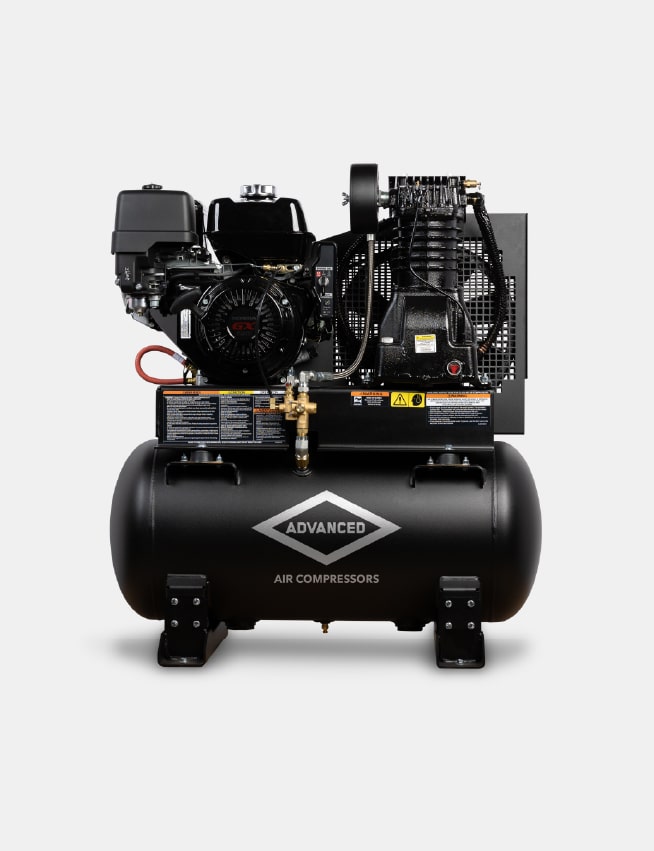
Let’s start with a basic description of what an air compressor is. An air compressor combines a pump with a strong tank, into which is pumped air under pressure. This pressurized air can be used for many residential, commercial and industrial applications. You may have even used one to air up a low or flat tire on your vehicle, but the applications go far beyond that point to power what are known as pneumatic, or air-powered, tools. These include grinders, ratchet drivers, spray rigs, power washers, drills, metal shears, grease guns and many more tools that are used on a daily basis.
So, what makes an air compressor an industrial air compressor? Consider the difference between, as an example, a push lawn mower and a large zero-radius mower. When you just need a little power, a push mower may work fine, but if you’ve got multiple acres to mow, a zero-radius mower is what you’re going to want. It’s the same with industrial air compressors, where you’ll need an air compressor that is tougher, rated to higher pressures and able to take the daily work and abuse that the environment may throw at it. An industrial air compressor will work harder, longer and faster to achieve the results needed in a more efficient manner, without breaking down.
Air Compressor Sizing
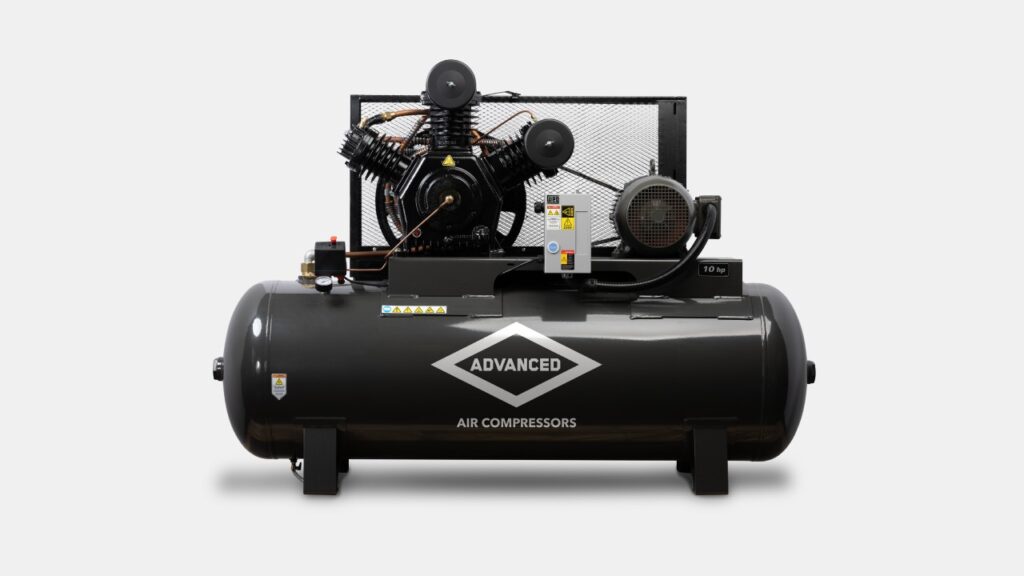
There is a wide range of air compressor sizes, from tiny one- or two-gallon pancake air compressors for homeowners to use on occasion up to several hundred gallons of holding capacity. The gallon size refers to the volume of air your air compressor tank can hold. Just like a ten-gallon fish tank can hold ten gallons of water, a ten-gallon air compressor can hold ten gallons of compressed air.
Generally speaking, you’re going to base the size of the air compressor you need on the type of work that you’re doing. Take a solid look at the tools you’re going to use with your air compressor and see what kind of demand they’ll create. As an example, a paint spraying rig may work best using an air compressor that has a minimum capacity of 20 gallons but may still be able to work with an air compressor that has a capacity of 10 gallons. However, at the lower end, you’ll notice that you’re getting inconsistent pressure and that your air compressor is cycling, or turning on and off repeatedly, to try to keep up with the workload.
You’ll also want to take into consideration that you may have multiple tools running at the same time. In doing so, you’re creating a larger overall draw on your air compressor that may need to be considered when selecting the size of your compressor. Think about how much air you’ll need to supply to different tools in your setup if they were all running at the same time, then add a little buffer to ensure your air compressor can keep up with demand.
Air Compressor Types
Rotary Screw
A rotary screw air compressor will last longer, provide more consistent airflow, can be used with or without a storage tank for the compressed air, and can have a 100% duty cycle, drastically reducing downtime. Its construction allows it to move a higher quantity of air per horsepower than other types of air compressors, while its quieter operation and higher energy efficiency levels make it a great option for most commercial air compressor needs.
Reciprocating (Piston)
However, there are some situations in which a reciprocating air compressor may be a better option for your needs. In this type of commercial air compressor, a piston is used to compress air into a storage tank, from which it is released at a metered rate into the tools that are being used with it. Generally, it’s going to be able to reach higher pressures than a rotary screw air compressor, have simple maintenance and will be less expensive to purchase. However, the trade-off is that it will require more maintenance time and will fail earlier in the lifespan.
Air Compressor Performance
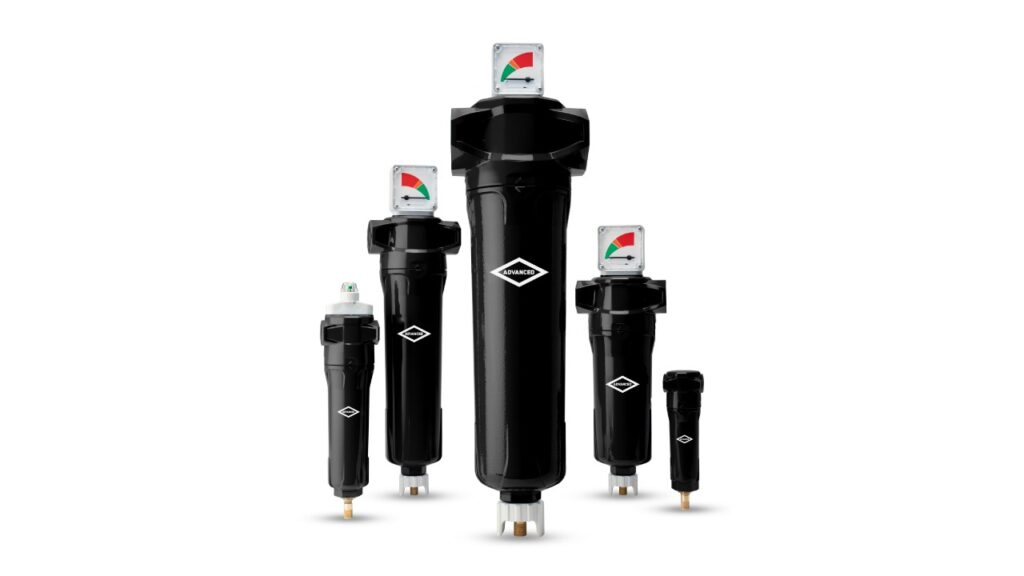
When your air compressor is working well, there are specific ways to keep it operating efficiently for longer periods of time. Though you may expect this from well-serviced machines, there are a couple of other factors you should also consider when selecting your industrial air compressor to ensure you’re getting the right machinery for your needs.
Tank Size and Performance
One of the biggest concerns is tank size. Tank size can promote or reduce short cycling, which is what happens when a machine cycles on and then off again frequently. These short cycles can cause a lot of wear and tear on the machine and are usually a sign that you have a tank that is too small for your needs. By starting out erring on the side of caution with a larger tank, you can ensure that you’ll be able to get the kind of performance you need without a lot of headaches in the process.
Ambient Conditions
The ambient conditions around your air compressor can have a big impact on its performance. If you’re working in marine environments, hot climates or areas with extreme outdoor conditions, you’ll want to talk to the company you’re purchasing from to ensure that they’re looking for the best option for your needs. Using a standard commercial air compressor in harsh environments can have a large impact on reliability.
Elevation
Elevation can also have a big impact on the performance of your air compressor. As an example, if you travel through the mountains, you may notice that pre-packaged bags of chips swell up because the pressure on the outside of the bag is no longer the same as the pressure on the inside of the bag. In this same way, taking the same air compressor that worked for your operation at sea level to the mountains will have a big impact on performance, because it must run much longer to build up the same amount of pressure in the low-pressure environment.
Service Programs
One of the biggest impactors of performance in industrial air compressor systems is having an effective service program in place. Whether you’re taking care of servicing your commercial air compressor or you’re hiring out the work, it’s a vital part of preserving your air compressor’s efficiency. It’s estimated that lack of maintenance can result in a 7% increase in energy use, because the equipment is no longer able to operate as smoothly and efficiently. Make sure to take the time to have your industrial air compressor serviced regularly.
Additional Tools & Accessories
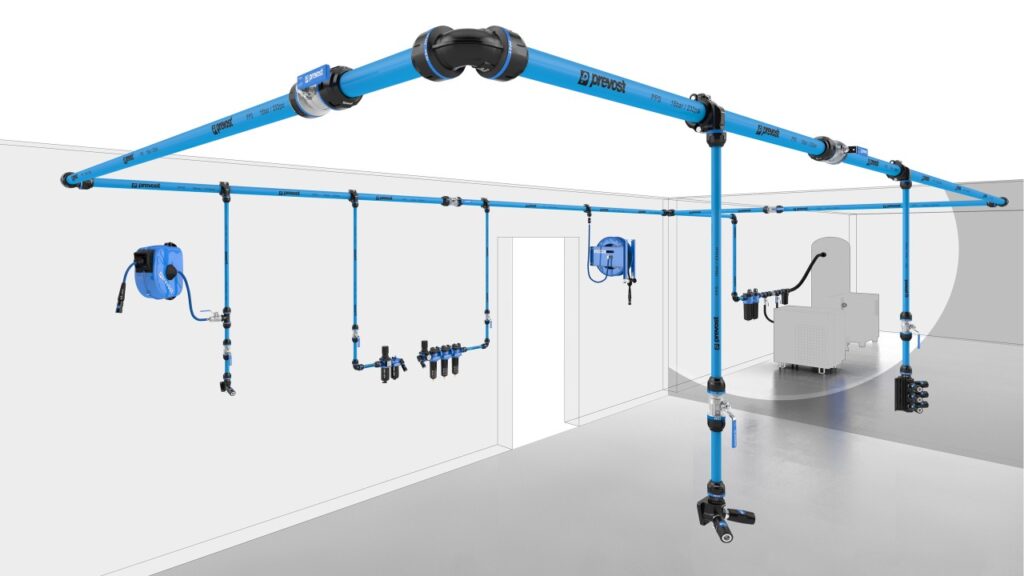
Now that you’ve decided on an air compressor, have you thought about the different accessories, lines and tools you’ll need to keep it operating effectively and efficiently? Let’s look at some of the biggest add-ons that can impact your commercial air compressor performance and reliability.
Pipe Sizing
Having sufficient pipe size is vital to keeping your equipment operating effectively. It’s very easy to get caught up in simply laying out piping that will provide you with a minimum level of support, but when you need to really add demand to your equipment, you’ll quickly run into issues with low pressure and variation in pressure providing inconsistent results.
Air Filters
Air filters remove dust from the air as it enters your air compressor, preventing it from showing up further down the line. Dust and debris can also cause a lot of wear and tear on the moving parts of your air compressor, so removing it before it enters the system is a vital part of ensuring the longevity of your commercial air compressor.
Air Dryers
By comparison, air dryers remove moisture from the air before it is passed onto the internal parts of your industrial air compressor, so that it doesn’t cause corrosion on the inside of your equipment. Though you may not notice the humidity, the shear amount of air that is compressed into your equipment can cause the moisture to build up quickly, causing rust, freeze-ups and other issues with your equipment.
Finding the right industrial air compressor for your needs is more complex than simply driving down to the local store and tossing one in the back end. It takes careful consideration of your environment, needs and expectations. If you need help finding the perfect commercial air compressor for your company’s needs, the experienced professionals at Advanced Air & Vacuum would be happy to work with you to find the perfect solution. Please feel free to reach out today with any questions or for more information.

